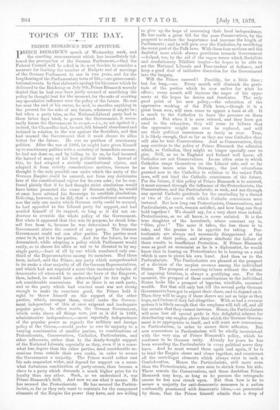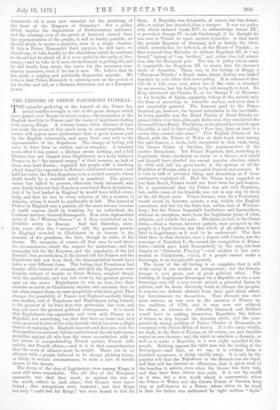TOPICS OF THE DAY.
PRINCE BISMARCK'S NEW ATTITUDE.
PRINCE BISMARCK'S speech of Wednesday week, and the startling announcement which has immediately fol- lowed the prorogation of the German Parliament,—that the Federal Council will be asked in its next Session to consider a measure for limiting the number of Budgets and of meetings of the German Parliament to one in two years, and for the lengthening of the Parliamentary term of life,--are groe consti- tutional events. In that elaborate apology for his career which he delivered to the Reichstag on July 9th, Prince Bismarck warmly denied that he had ever been justly accused of sacrificing the policy he thought best for the moment, for the sake of exerting any speculative influence over the policy of the future. He was too near the end of his career, he said, to sacrifice anything in the present for the sake of any future, whatever it might be ; but when a party tries, as the National-Liberal party had in these latter days tried, to govern the Government, it neees- eerily forces the Government to re-act,—i.e., to act against it ; indeed, the Chancellor had, he said, felt himself abandoned and isolated in relation to the war against the Socialists, and this had warned the Government that it must choose its allies better for the future. He was no partisan of reactionary politics. After the war of 1866, he might have given himself up to reactionary politics with a certainty of immediate success ; he had not done so, and by failing to do so, he had incurred the hatred of many of his best political friends. Instead of this, he had adopted a strictly constitutional regime, and adopted it from strictly conscientious motives, because he thought it the only possible one under which the unity of the German Empire could be assured, not from any doctrinaire love of the constitutional regime for its own sake ; for he con- fessed plainly that if he had thought strict absolutism would have better promoted the cause of German unity, he would at once have advised his Sovereign to establish absolutism. Believing, however, as he did, that a constitutional monarchy was the only one under which German unity could be assured, he had appealed to the Liberal party for support, and had availed himself of its support, so long as it did not en- deavour to override the whole policy of the Government. But when it appeared that this was its purpose, he shook him- self free from it, because he was determined to keep the Government above the control of any party. The German Government could not run after parties. The parties must come to it, not it to the parties. And for the future, he was determined, while adopting a policy which Parliament would ratify, so to choose his allies as not to be dictated to by any single party,—least of all by one which numbered only one- third of the Representatives among its members. Had there been, indeed, said the Prince, any party which comprehended in its ranks a clear majority of all the German Representatives, and which had not required a more than moderate infusion of democratic oil wherewith to anoint the brow of the Emperor, then, indeed, he would have acknowledged its fair right to ask considerable concessions. But as there is no such party, and as the party which had exacted most was not strong enough to make its exactions good, the Prince held it right to throw himself on the support of the other parties, which, amongst them, would make the Govern- ment independent of this at once exigeant and inadequate popular party. In other words, the German Government, which seeks above all things now, just as it did in 1863, administrative independence,—more especially independence of the popular power as regards the military and foreign policy of the Crown,—would prefer to owe its majority to a varying combination of smaller parties, to combinations of Protectionists, Conservatives, Catholics, Particularists, and other adherents, rather than to the dearly-bought support of the National Liberals, especially as they, even if in a some- what less degree than the other parties, need considerable ac- cessions from outside their own ranks, in order to secure the Government a majority. The Prince would rather cast his nets somewhat wider, and depend for support on a some- what fortuitous combination of party-atoms, than become a slave to a party which demands a much higher price for its loyalty than any other. Such, as we understand it, was Prince Bismarck's drift. And now we see what it means. He has secured the Protectionists. He has secured the Partieu- huists, so far as they only want to maintain for the component elements of the Empire the power they have, and are willing
to give up the hope of recovering their local independence. Ile has made a great bid for the pure Conservatives, by the proposal to reduce the importance and increase the length of Parliaments ; and he will gain over the Catholics, by sacrificing the worst part of the Falk laws. With these four sections and the doubtful mass which always gravitates towards Government —helped, too, by the aid of the vague terror which Socialists and revolutionary Nihilists inspire—he hopes to be able to set the National Liberals and Free-traders at defiance, and keep a good deal of initiative discretion for the Government into the bargain.
Will the Prince succeed ? Possibly, for a little time ; but for long,—no. Every month will diminish the grati- tude of the parties which he now unites for what he offers ; every month will increase the anger of his oppo- nents at the hopes he denies and frustrates. The only good point of his new policy,—the relaxation of the oppressive working of the Falk laws,—though it is a great boon now, will soon cease to appear a boon at all. It is much to the Catholics to have the pressure on them relaxed. But when it is once relaxed, and they have got used to the relaxation, they will cease to believe that the oppressive weight can ever be replaced, and will use their political consciences as freely as ever. True, it is likely enough, that so far as they are true Catholics they will also be true Conservatives. And as Conservatives, they may continue to the policy of Prince Bismarck the adhesion which, as Catholics, they might no longer specially care to give. Still, as we in England and Ireland well know, all Catholics are not Conservatives, Issues often arise in which Catholics range themselves on the Liberal side, and so far as these issues arise in Germany, the just relaxations granted now to the Catholics in relation to the unjust Falk laws, will not bind the Catholic consciences of the future. For the future, if this policy of Prince Bismarck is to succeed, it must succeed through the influence of the Protectionists, the Conservatives, and the Particularists, as such, and not through any special Catholic gratitude for the unwinding by a thread or two of the screw with which Catholic consciences were tortured. But how long can Protectionists, Conservatives, and Particularists, as such, remain satisfied, and how long can they hold together ? We should say, for a very short time indeed. Protectionism, as we all know, is never satiated. It is the true daughter of the horseleech, whose constant cry is, "Give, give I " The more it takes, the less there is to
take, and the greater is its appetite for taking. Pro- tectionists are always and necessarily disappointed at the results of their policy, and always attribute the failure of these results to insufficient Protection. If Prince Bismarck were as good an economist as he is a diplomatist, he would know that in leaning on Protectionism he is leaning on a reed which is sure to pierce his own hand. And then as to the Particularists. The Particularists are pleased at the prospect of a division of the surplus revenue among the individual States. The prospect of receiving tribute without the odium of imposing taxation, is always a gratifying one. For the moment, the prospect of these contributions to the individual States looks like a prospect of legacies, windfalls, unearned wealth. But that will only last till the several petty German Governments have got to expect their share, and to depend on it. Then they will be angry if these shares are not as large as they hope, and furious if they fail altogether. With so bad a revenue system it is likely enough that the surpluses will fall off, and all but certain that they cannot increase. Hence, the Particularists will soon lose all special pride in this delightful scheme for distributing any surplus above that which the German Govern- ment is to appropriate to itself, and will want new concessiona to Particularism, in order to secure their adhesion. But new concessions to Particulariera will be wholly inconsistent with the very aim of Prince Bismarck's policy, which he confesses to be German unity. Already for years he has been wounding the Particularists in every political nerve they have. And he must wound them again and again, if he is to bind the Empire closer and closer together, and counteract all the centrifugal elements which always exist in such a, Confederation. Hence the Particularists, still more even than the Protectionists, are sure soon to shrink from his side. There remain the Conservatives, and these doubtless Prince Bismarck may keep, so long as he pursues the retrograde course he has now struck upon. But then how is he to secure a majority for anti-democratic measures in a nation confessedly penetrated with democratic ideas,—so penetrated by them, that the Prince himself admits that a drop of
democratic oil is even now essential for the anointing of the brow of the Emperor of Germany ? For a policy which implies the degradation of Parliamentary influence, and the wresting even of the power of financial control from the representatives of the people, it will be hardly possible, we should think, to secure a majority, even in a single election. If this is Prince Bismarck's fixed purpose, he will have, we should say, to take frankly to the absolutism which he confesses he should not be afraid of, if it were useful to the unity of Ger- many,—and to take to it soon, for he himself is getting old, and he will hardly long retain the nerve for the necessary reac- tionary measures, even if he has it now. We believe that he has made a mighty and politically disgraceful mistake. We believe that Prince Bismarck is entering now on the period of his decline and fall, as a German statesman and as a European power.



































 Previous page
Previous page